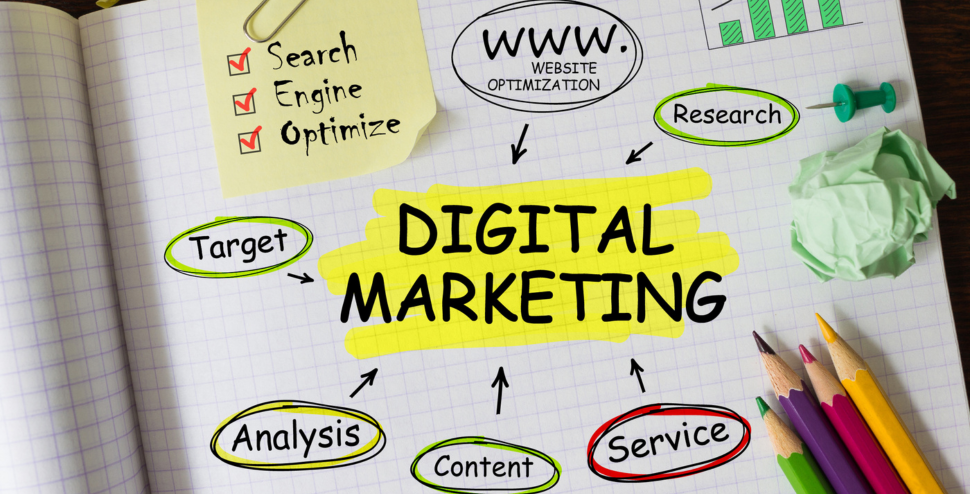Digital marketing involves using digital platforms to connect with your audience. Unlike traditional marketing methods—such as print ads, billboards, or television commercials—digital marketing leverages technology to create targeted campaigns. This approach allows businesses to interact with customers in real-time and gather valuable data to refine their strategies.

Key Components of Digital Marketing
Here are some essential aspects that make up digital marketing:
- Search Engine Optimization (SEO):
- Improves website visibility on search engines like Google.
- Involves optimizing content, keywords, and site structure.
- Example: A local bakery uses SEO to rank higher in search results when someone searches for “fresh bread near me.”
- Content Marketing:
- Focuses on creating valuable and relevant content.
- Aims to engage, educate, and build trust with the audience.
- Example: A fitness coach shares workout tips and healthy recipes on a blog or social media.
- Social Media Marketing:
- Uses platforms like Facebook, Instagram, Twitter, and LinkedIn to promote products or services.
- Involves engaging with followers, sharing content, and running targeted ads.
- Example: A clothing brand posts daily outfit inspirations and interacts with followers through comments and live videos.
- Email Marketing:
- Sends promotional messages, newsletters, or special offers directly to a subscriber’s inbox.
- Highly customizable and measurable for performance.
- Example: An online retailer sends personalized discount codes to customers on their birthdays.
- Pay-Per-Click Advertising (PPC):
- Advertisers pay a fee each time someone clicks on their online ad.
- Common platforms include Google Ads and social media advertising.
- Example: A software company runs PPC campaigns to promote its new app and attract immediate interest.
- Affiliate Marketing:
- Involves partnering with influencers or other companies to promote your products.
- Partners earn a commission for each sale generated through their referral.
- Example: A beauty brand collaborates with bloggers who review and recommend its products.
Why Is Digital Marketing Important?
Digital marketing is crucial for several reasons:
- Cost-Effectiveness:
- Compared to traditional marketing, digital campaigns can be more budget-friendly.
- Allows businesses to reach a larger audience without a huge expenditure.
- Measurable Results:
- Digital campaigns provide detailed insights on performance.
- Helps marketers understand what works and adjust their strategies accordingly.
- Targeted Reach:
- Digital platforms allow for precise audience targeting based on interests, behaviors, and demographics.
- Ensures the marketing message reaches the right people.
- Flexibility and Speed:
- Digital campaigns can be launched and modified quickly.
- Real-time feedback allows for swift changes to improve results.
How Digital Marketing Helps Your Business Grow?
Digital marketing is a simple and effective way to boost your business online. By using tools like social media, search engines, and email, you can easily reach people who are interested in what you offer.
One of the best parts of digital marketing is that it doesn’t cost a fortune. You can start with a small budget, try different ideas, and see real results quickly. Here are a few ways it makes a difference:
- Connect with the Right People:
You can target your audience based on what they like, where they live, or even their online habits. This helps you share your message with people who are more likely to become customers. - See What Works:
With digital tools, you can track how well your campaigns are doing. This means you can quickly find out what works and adjust your approach if needed. - Build Real Relationships:
Digital marketing lets you interact directly with your customers. Whether through social media or email, these conversations help build trust and make your brand feel more personal. - Quick and Flexible:
Unlike traditional ads that might take a long time to set up, digital marketing lets you launch and change campaigns fast. This helps you stay current with trends and respond to your customers’ needs right away.
In a nutshell, digital marketing makes it easier and more affordable to get your message out, connect with people, and grow your business. Whether you’re just starting out or looking to expand, it offers a modern way to reach your goals and build lasting customer relationships.
Real-World Example
Imagine you’re launching a new eco-friendly water bottle. Here’s how you could use digital marketing:
- SEO & Content Marketing:
- Create blog posts about environmental sustainability and the benefits of reusable water bottles.
- Optimize your website with relevant keywords like “eco-friendly water bottle” or “sustainable hydration.”
- Social Media Marketing:
- Share engaging posts and behind-the-scenes videos on Instagram.
- Run targeted ads to reach environmentally conscious consumers.
- Email Marketing:
- Build an email list by offering a free guide on reducing plastic waste.
- Send newsletters with product updates and special discounts.
- PPC Advertising:
- Use Google Ads to target searches related to eco-friendly products.
- Track performance and adjust bids to maximize clicks and conversions.
- Affiliate Marketing:
- Partner with eco-influencers who can review your product.
- Offer them a commission on each sale made through their referral.
Tips for Beginners
- Start Small:
Focus on one or two channels first, such as social media and content marketing, then expand as you learn what works best for your business. - Learn Continuously:
Digital marketing trends evolve quickly. Stay updated with the latest techniques and tools through blogs, webinars, and online courses. - Measure Your Success:
Use tools like Google Analytics and social media insights to track your campaign performance. Adjust strategies based on the data you collect. - Engage with Your Audience:
Respond to comments, ask for feedback, and build a community around your brand. This personal touch can set you apart from competitors.
Digital marketing is a dynamic field that offers endless opportunities for businesses of all sizes. By understanding its core components and applying them strategically, you can create effective campaigns that not only reach but resonate with your audience.
